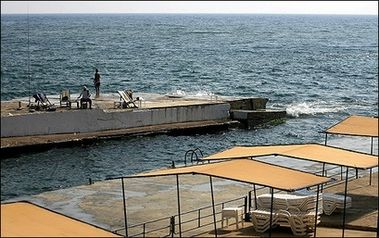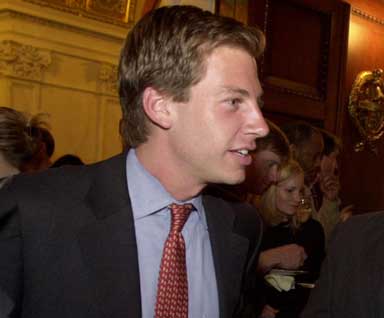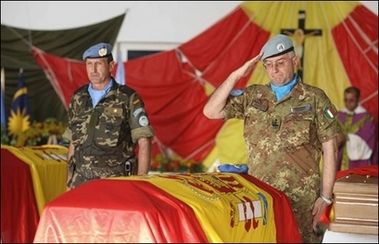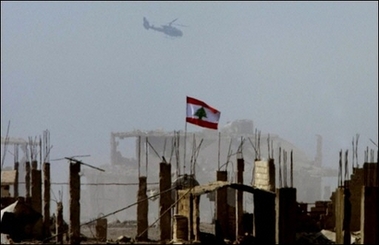الباحث والمحلل السياسي اللبناني يرى أن ما تقوم به عصابة شاكر العبسي تنفيذ لتوجيهات سورية
سجعان القزي لـ "السياسة": كل المخيمات الفلسطينية في لبنان "نهر بارد"
جريدة السياسة الكويتية : الخميس، 21 – يونيو – 2
بيروت ـ من صبحي الدبيسي:
المقدمة
اعتبر الباحث والمحلل السياسي سجعان القزي أن التوطين أصبح واقعاً في لبنان منذ توقيع اتفاق القاهرة سنة، 1969 لاسيما مع تمدد الوجود الفلسطيني بشرياً وعسكرياً في كل لبنان وتحوله في نفس الوقت إلى مشروع دولة محل الدولة اللبنانية، لكنه لفت إلى أن هذا المشروع سقط مع مقاومة اللبنانيين له في حرب نيسان/ ابريل، 1975 وظن اللبنانيون سنة 1982 أن المخيمات الفلسطينية عادت مخيمات، فإذا بهم بتفاجاؤن بأنها أصبحت مجدداً معسكرات ودويلات داخل الدولة اللبنانية. وكل مخيم فلسطيني في لبنان بات دولة فلسطينية على غرار الدولة الفلسطينية المنشأة في الأراضي الفلسطينية المستعادة.
وفي موضوع التوطين الفلسطيني رأى القزي أنه ليس بحاجة إلى حرب "نهر البارد" لكي ينفذ، فهو قائم بحكم الوجود الفلسطيني داخل المخيمات وخارجها، بحكم عدم وجود سلطة الدولة في هذه المخيمات، وخاصة بحكم عدم وجود أفق حل لا للقضية الفلسطينية فحسب، وإنما للانتشار الفلسطيني خارج الأراضي الفلسطينية المحتلة أيضاً، مشدداً على أن الوضع الفلسطيني في لبنان لا يمكن أن يبقى بعد معركة "نهر البارد"، مثلما كان قبلها.
كلام قزي جاء في سياق حوار أجرته معه "السياسة"، تناول فيه أبعاد حرب مخيم "نهر البارد"، وخطر توطين الفلسطينيين في لبنان، ومسببات تفشي الأصوليتين الشيعية والسنية فيه، معدداً ثلاثة عوامل ساهمت بإعادة تسلح الفلسطينيين في المخيمات من بينها الصراع الخفي بين منظمة التحرير الفلسطينية وركنها الأساسي "فتح" من جهة، والمنظمات الفلسطينية الأصولية بركنيها الأساسيين "حماس" و"الجهاد الإسلامي" من جهة أخرى، ويضاف إليها الحالة الأصولية المنتشرة خارج لبنان والتي قررت أن تنشئ لها قواعد انطلاقاً من المخيمات في لبنان
 BEIRUT Daily star: A hotel owner called on all tourist establishments in Beirut to abide by a two day strike on Monday to protest the government’s negligence of the tourism sector. Amin Khayat, also president of the Tourist Institutions in Beirut, warned the strike is just the beginning. "We may resort to other means in the next 15 days if the government and the concerned parties refrained from assisting the tourism sector," Khayat told a press conference. "The government promised us to secure a special fund to help the tourism sector. But none of their promises were fulfilled." He said that hotels will stop receiving visitors for two days.
BEIRUT Daily star: A hotel owner called on all tourist establishments in Beirut to abide by a two day strike on Monday to protest the government’s negligence of the tourism sector. Amin Khayat, also president of the Tourist Institutions in Beirut, warned the strike is just the beginning. "We may resort to other means in the next 15 days if the government and the concerned parties refrained from assisting the tourism sector," Khayat told a press conference. "The government promised us to secure a special fund to help the tourism sector. But none of their promises were fulfilled." He said that hotels will stop receiving visitors for two days.  BEIRUT – Former ministers who figure on a list of Syrian and Lebanese personalities banned from entering the United States said on Saturday they felt
BEIRUT – Former ministers who figure on a list of Syrian and Lebanese personalities banned from entering the United States said on Saturday they felt  BEIRUT (AFP) – The UN force in south Lebanon expects a "summer of peace" for the region despite the menace of more attacks on peacekeepers, their commander said in an interview published on Thursday. But he also called for more to be done in clearing the region of weapons."We take seriously the possibility of other attacks. We hope the new security measures and the political process will manage to prevent them," said Major-General Claudio Graziano of the UN Interim Force in Lebanon (UNFIL).
BEIRUT (AFP) – The UN force in south Lebanon expects a "summer of peace" for the region despite the menace of more attacks on peacekeepers, their commander said in an interview published on Thursday. But he also called for more to be done in clearing the region of weapons."We take seriously the possibility of other attacks. We hope the new security measures and the political process will manage to prevent them," said Major-General Claudio Graziano of the UN Interim Force in Lebanon (UNFIL). By Nazih Siddiq, QALAMOUN, Lebanon (Reuters) – Lebanese soldiers killed six Islamist militants, most of them foreigners, during a clash on the outskirts of the northern town of Qalamoun early on Thursday, security sources said. A military source said the gunmen appeared to be linked to al Qaeda-inspired militants of
By Nazih Siddiq, QALAMOUN, Lebanon (Reuters) – Lebanese soldiers killed six Islamist militants, most of them foreigners, during a clash on the outskirts of the northern town of Qalamoun early on Thursday, security sources said. A military source said the gunmen appeared to be linked to al Qaeda-inspired militants of  By James Farha, Daily Star
By James Farha, Daily Star BBC, Lebanese troops said they had largely defeated Islamist rebels in a northern refugee camp, but continued their siege amid sporadic shelling and gunfire. Officials said the gunfire came from mopping up operations, and explosions were booby traps being destroyed. Leaders of Fatah al-Islam at the Nahr al-Bared camp were on the run, Defence Minister Elias Murr said on Thursday. A month of fighting has left 170 people dead, in Lebanon’s worst internal violence since the 1975-90 civil war. Some correspondents said parts of the old camp – densely populated areas packed with long-term Palestinian refugees – were still outside the army’s control. The so-called new camp, where gunfire has been focused, is now a devastated wasteland of shattered concrete. Mr Murr had told Lebanese TV that the army had "crushed those terrorists". "What is happening now is some clean-up that the army’s heroes are carrying out, and dismantling some mines," he said
BBC, Lebanese troops said they had largely defeated Islamist rebels in a northern refugee camp, but continued their siege amid sporadic shelling and gunfire. Officials said the gunfire came from mopping up operations, and explosions were booby traps being destroyed. Leaders of Fatah al-Islam at the Nahr al-Bared camp were on the run, Defence Minister Elias Murr said on Thursday. A month of fighting has left 170 people dead, in Lebanon’s worst internal violence since the 1975-90 civil war. Some correspondents said parts of the old camp – densely populated areas packed with long-term Palestinian refugees – were still outside the army’s control. The so-called new camp, where gunfire has been focused, is now a devastated wasteland of shattered concrete. Mr Murr had told Lebanese TV that the army had "crushed those terrorists". "What is happening now is some clean-up that the army’s heroes are carrying out, and dismantling some mines," he said By HUSSEIN DAKROUB, Associated Press Writer, BEIRUT, Lebanon Jun 18 – Fierce fighting erupted Monday at a besieged Palestinian refugee camp as Lebanese troops resumed bombardment of al-Qaida-inspired militants barricaded inside. Three Lebanese soldiers were killed, a senior military official said.
By HUSSEIN DAKROUB, Associated Press Writer, BEIRUT, Lebanon Jun 18 – Fierce fighting erupted Monday at a besieged Palestinian refugee camp as Lebanese troops resumed bombardment of al-Qaida-inspired militants barricaded inside. Three Lebanese soldiers were killed, a senior military official said.